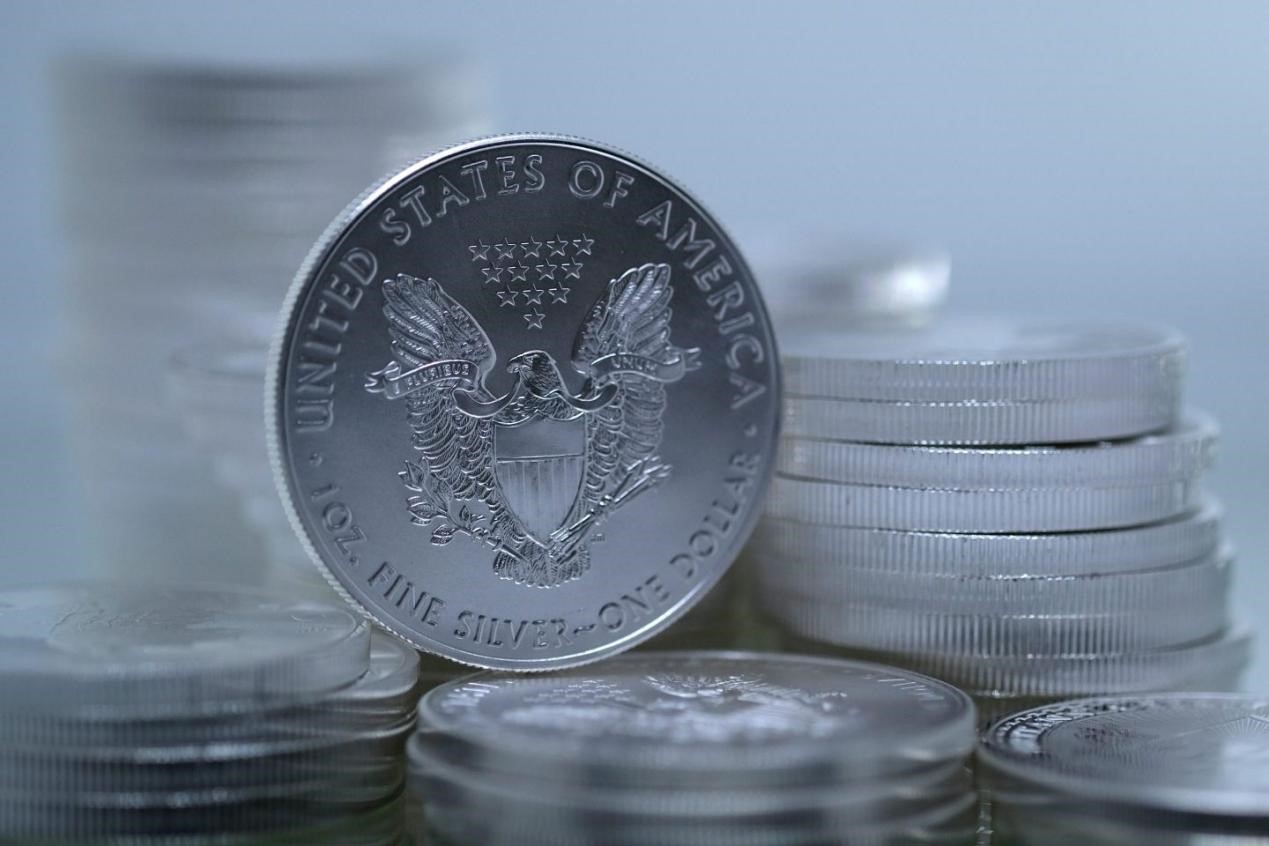 圖片來(lái)源:YURIKO NAKAO—GETTY IMAGES
圖片來(lái)源:YURIKO NAKAO—GETTY IMAGES在美國(guó),投資實(shí)物貴金屬的人不在少數(shù),特別是有很多人購(gòu)買了號(hào)稱最能夠抵抗通脹的美國(guó)鷹洋銀幣(American Eagle)。但是在美國(guó)商品期貨交易委員會(huì)(U.S. Commodity Futures Trading Commission)宣布啟動(dòng)一樁調(diào)查之后,幾百名投資者突然被告知,用來(lái)存放他們花幾百萬(wàn)美元購(gòu)買的銀幣的金庫(kù)居然是空的。
在這起涉嫌欺詐案件中,貴金屬交易商羅伯特·希金斯經(jīng)營(yíng)的兩家公司被要求向受害者支付1.127億美元賠償,并繳納3,300萬(wàn)美元的民事罰款。
美國(guó)有關(guān)部門對(duì)希金斯和兩家相關(guān)公司的調(diào)查是從去年開始的。
根據(jù)美國(guó)商品期貨交易委員會(huì)的一份聲明,在2014年至2022年期間,希金斯通過(guò)兩家公司(Argent Asset Group LLC和First State Depository Company, LLC)開展了具有欺詐性質(zhì)的白銀租賃業(yè)務(wù)。
騙局
該業(yè)務(wù)以“Maximus項(xiàng)目”(Maximus Program)的名字出售給客戶,他們首先向銀幣的所有者支付租賃費(fèi),以換取Argent公司對(duì)商品的使用權(quán)。
這筆費(fèi)用是與租賃銀幣的數(shù)量掛鉤的,也就是會(huì)隨著客戶愿意提供多少銀幣而增減。
這些銀幣要么是歸客戶所有,要么可以通過(guò)Argent公司購(gòu)買,而且這些銀幣據(jù)稱都存放在First State Depository公司在美國(guó)特拉華州的一座金庫(kù)里。
客戶還被告知,他們的投資是靠譜的,而且是上了充分的保險(xiǎn)的。
像美國(guó)鷹洋這種貴金屬錢幣的購(gòu)買者,往往是那些信不過(guò)無(wú)形資產(chǎn)(比如政府債券或股票)的投資者,他們往往更青睞貴金屬這種看得見摸得著的財(cái)富。
很多人之所以鐘愛(ài)美國(guó)鷹洋銀幣,是因?yàn)楸M管它的面值只有1美元,但它是由99.9%的純銀鑄造的,因此它的保值屬性遠(yuǎn)遠(yuǎn)超過(guò)了貨幣屬性。
這些銀幣都是由美國(guó)鑄幣廠(U.S. Mint)生產(chǎn)的,從而保證了它們的真實(shí)性。而且它們的鑄造數(shù)量是有限的,以保證它們的稀有性。目前,2023年發(fā)行的10盎司鷹洋銀幣的零售價(jià)為76美元。
這些客戶誤以為自己是了解這些銀幣帶來(lái)的收入的,因?yàn)槊總€(gè)月他們都會(huì)收到公司發(fā)來(lái)的報(bào)告,而檢方則稱這些報(bào)告“錯(cuò)誤地暗示了這些資產(chǎn)仍然安全地存放在FSD公司里。”
消失的銀幣
法庭文件顯示,按理說(shuō)應(yīng)該存放在FSD公司的大量銀幣根本不存在。
6月20日公布的法庭文件顯示,天職國(guó)際(Baker Tilly)的會(huì)計(jì)師曾經(jīng)參與對(duì)該金庫(kù)的盤點(diǎn),結(jié)果發(fā)現(xiàn),價(jià)值近1.13億美元的客戶資產(chǎn)不翼而飛了。
《財(cái)富》雜志看到的這份文件寫道:“例如,他們?cè)贔SD公司發(fā)現(xiàn)了一些空箱子,上面寫著某個(gè)客戶的名字,但是有的箱子里并無(wú)貴金屬,而是附有一張類似‘欠條’的紙,上面寫明了本應(yīng)存放在這里的貴金屬種類和數(shù)量。”
此外,有的客戶連類似的記錄都沒(méi)有找到,甚至連一個(gè)寫著他們名字的空箱子都沒(méi)有。
《財(cái)富》雜志看到的文件顯示,天職國(guó)際的會(huì)計(jì)師本來(lái)預(yù)計(jì)會(huì)找到大約120萬(wàn)枚美國(guó)鷹洋銀幣,但結(jié)果實(shí)際只發(fā)現(xiàn)了不到38萬(wàn)枚。
同樣,會(huì)計(jì)師們?cè)绢A(yù)計(jì)還會(huì)找到11,125枚美國(guó)鷹洋金幣(Gold American Eagle),結(jié)果只發(fā)現(xiàn)了1,936枚。
因此,美國(guó)商品期貨交易委員會(huì)的律師們聲稱,被告出于不當(dāng)?shù)美康摹芭灿谩绷诉@些貴金屬,要么是自己用掉了,要么就是悄悄賣了。
美國(guó)商品期貨交易委員會(huì)還聲稱,一些花錢購(gòu)買鷹洋的客戶從未真正拿到這些貴金屬錢幣,而是被賣家直接把錢裝進(jìn)了他們的腰包。
美國(guó)商品期貨交易委員會(huì)的執(zhí)法部主管伊恩·麥金利表示,他一定要“根除貴金屬市場(chǎng)的欺詐行為。”
不過(guò)美國(guó)商品期貨交易委員會(huì)也警告道,盡管損害賠償金已經(jīng)判給了客戶,但由于被告可能沒(méi)有足夠的資產(chǎn)進(jìn)行賠付,所以并不能夠保證他們一定可以拿回資金。
本案客戶若想了解關(guān)于此案的最新信息,可以訪問(wèn)First State Depository公司的官方網(wǎng)站,目前該網(wǎng)站已經(jīng)被處理此案的官方部門接管。(財(cái)富中文網(wǎng))
譯者:樸成奎
在美國(guó),投資實(shí)物貴金屬的人不在少數(shù),特別是有很多人購(gòu)買了號(hào)稱最能夠抵抗通脹的美國(guó)鷹洋銀幣(American Eagle)。但是在美國(guó)商品期貨交易委員會(huì)(U.S. Commodity Futures Trading Commission)宣布啟動(dòng)一樁調(diào)查之后,幾百名投資者突然被告知,用來(lái)存放他們花幾百萬(wàn)美元購(gòu)買的銀幣的金庫(kù)居然是空的。
在這起涉嫌欺詐案件中,貴金屬交易商羅伯特·希金斯經(jīng)營(yíng)的兩家公司被要求向受害者支付1.127億美元賠償,并繳納3,300萬(wàn)美元的民事罰款。
美國(guó)有關(guān)部門對(duì)希金斯和兩家相關(guān)公司的調(diào)查是從去年開始的。
根據(jù)美國(guó)商品期貨交易委員會(huì)的一份聲明,在2014年至2022年期間,希金斯通過(guò)兩家公司(Argent Asset Group LLC和First State Depository Company, LLC)開展了具有欺詐性質(zhì)的白銀租賃業(yè)務(wù)。
騙局
該業(yè)務(wù)以“Maximus項(xiàng)目”(Maximus Program)的名字出售給客戶,他們首先向銀幣的所有者支付租賃費(fèi),以換取Argent公司對(duì)商品的使用權(quán)。
這筆費(fèi)用是與租賃銀幣的數(shù)量掛鉤的,也就是會(huì)隨著客戶愿意提供多少銀幣而增減。
這些銀幣要么是歸客戶所有,要么可以通過(guò)Argent公司購(gòu)買,而且這些銀幣據(jù)稱都存放在First State Depository公司在美國(guó)特拉華州的一座金庫(kù)里。
客戶還被告知,他們的投資是靠譜的,而且是上了充分的保險(xiǎn)的。
像美國(guó)鷹洋這種貴金屬錢幣的購(gòu)買者,往往是那些信不過(guò)無(wú)形資產(chǎn)(比如政府債券或股票)的投資者,他們往往更青睞貴金屬這種看得見摸得著的財(cái)富。
很多人之所以鐘愛(ài)美國(guó)鷹洋銀幣,是因?yàn)楸M管它的面值只有1美元,但它是由99.9%的純銀鑄造的,因此它的保值屬性遠(yuǎn)遠(yuǎn)超過(guò)了貨幣屬性。
這些銀幣都是由美國(guó)鑄幣廠(U.S. Mint)生產(chǎn)的,從而保證了它們的真實(shí)性。而且它們的鑄造數(shù)量是有限的,以保證它們的稀有性。目前,2023年發(fā)行的10盎司鷹洋銀幣的零售價(jià)為76美元。
這些客戶誤以為自己是了解這些銀幣帶來(lái)的收入的,因?yàn)槊總€(gè)月他們都會(huì)收到公司發(fā)來(lái)的報(bào)告,而檢方則稱這些報(bào)告“錯(cuò)誤地暗示了這些資產(chǎn)仍然安全地存放在FSD公司里。”
消失的銀幣
法庭文件顯示,按理說(shuō)應(yīng)該存放在FSD公司的大量銀幣根本不存在。
6月20日公布的法庭文件顯示,天職國(guó)際(Baker Tilly)的會(huì)計(jì)師曾經(jīng)參與對(duì)該金庫(kù)的盤點(diǎn),結(jié)果發(fā)現(xiàn),價(jià)值近1.13億美元的客戶資產(chǎn)不翼而飛了。
《財(cái)富》雜志看到的這份文件寫道:“例如,他們?cè)贔SD公司發(fā)現(xiàn)了一些空箱子,上面寫著某個(gè)客戶的名字,但是有的箱子里并無(wú)貴金屬,而是附有一張類似‘欠條’的紙,上面寫明了本應(yīng)存放在這里的貴金屬種類和數(shù)量。”
此外,有的客戶連類似的記錄都沒(méi)有找到,甚至連一個(gè)寫著他們名字的空箱子都沒(méi)有。
《財(cái)富》雜志看到的文件顯示,天職國(guó)際的會(huì)計(jì)師本來(lái)預(yù)計(jì)會(huì)找到大約120萬(wàn)枚美國(guó)鷹洋銀幣,但結(jié)果實(shí)際只發(fā)現(xiàn)了不到38萬(wàn)枚。
同樣,會(huì)計(jì)師們?cè)绢A(yù)計(jì)還會(huì)找到11,125枚美國(guó)鷹洋金幣(Gold American Eagle),結(jié)果只發(fā)現(xiàn)了1,936枚。
因此,美國(guó)商品期貨交易委員會(huì)的律師們聲稱,被告出于不當(dāng)?shù)美康摹芭灿谩绷诉@些貴金屬,要么是自己用掉了,要么就是悄悄賣了。
美國(guó)商品期貨交易委員會(huì)還聲稱,一些花錢購(gòu)買鷹洋的客戶從未真正拿到這些貴金屬錢幣,而是被賣家直接把錢裝進(jìn)了他們的腰包。
美國(guó)商品期貨交易委員會(huì)的執(zhí)法部主管伊恩·麥金利表示,他一定要“根除貴金屬市場(chǎng)的欺詐行為。”
不過(guò)美國(guó)商品期貨交易委員會(huì)也警告道,盡管損害賠償金已經(jīng)判給了客戶,但由于被告可能沒(méi)有足夠的資產(chǎn)進(jìn)行賠付,所以并不能夠保證他們一定可以拿回資金。
本案客戶若想了解關(guān)于此案的最新信息,可以訪問(wèn)First State Depository公司的官方網(wǎng)站,目前該網(wǎng)站已經(jīng)被處理此案的官方部門接管。(財(cái)富中文網(wǎng))
譯者:樸成奎
Hundreds of depositors who handed millions to a silver dealer in exchange for precious minted coins were told their vaults were actually empty following an investigation by the U.S. Commodity Futures Trading Commission (CFTC)
Two firms run by precious metals dealer Robert Higgins have been ordered to pay out $112.7 million to the victims of an alleged complex fraudulent scheme, and $33 million in a civil monetary penalty.
The investigation into Higgins and two connected companies began last year.
According to a statement from the CFTC, between 2014 and 2022 Higgins conducted a fraudulent silver leasing scheme via two companies: Argent Asset Group LLC (Argent) and First State Depository Company, LLC.
The scheme
The plot, sold to customers as the ‘Maximus Program’, offered to pay owners of silver coins a lease fee in exchange for Argent’s use of the commodity.
The payments were on a “scale” and would increase or decrease depending on how many of their coins the client was willing to offer.
The coins were either already owned by the customers, or could supposedly be purchased through Argent, and were apparently in storage at a vault owned by First State Depository Company in Delaware.
Customers were also told their investments were guaranteed and fully insured.
Coins such as these—silver American Eagle dollars—are often purchased by investors who want to see something tangible for their money, as opposed to government bonds or stocks.
People buy the coins because—although they only have a $1 face value—they are made up of 99.9% fine silver, and thus hold their value as a precious metal as opposed to as a currency.
The bullions are also produced by the U.S. Mint, which guarantees their authenticity and are minted—or stamped—in limited numbers to guarantee their rarity. Currently, uncirculated silver 1oz coins from the 2023 release can be bought for $76 each.
The clients were also under the impression they had an eye on their income from the coins, as they were sent monthly reports from the company which prosecutors allege “falsely indicat[ed] that the assets remained safely stored at FSD.”
Vanishing coins
Court documents show that vast quantities of the coins apparently stored at the FSD facilities simply did not exist.
Documents published on June 20 reveal that accountants from Baker Tilly attended the vault to conduct an inventory check and found that nearly $113 million in client and customer assets were missing.
“In some instances, they found empty boxes at FSD with a customer’s or client’s name on it, or boxes that did not contain metal but instead held an “IOU” of sorts—a piece of paper stating the quantity of metal that should have been stored there,” the document seen by Fortune continues.
It goes on to add that in some customer cases no records had been kept at all—not even an empty box with their name on it.
Further inventories seen by Fortune show that Baker Tilly had expected to find around 1.2 million Silver American Eagle coins and instead discovered just under 380,000.
Likewise, the accountants also expected to find 11,125 Gold American Eagle coins and discovered just 1,936.
As a result, attorneys for the CFTC allege that the defendants “misappropriated” the coins, either using or selling them for their own benefit.
The CFTC also claims that some customers who had paid for more bullions never got them, with the parties instead pocketing the cash.
The CFTC’s director of enforcement, Ian McGinley, said he was committed to “rooting out fraud” in the precious metals market.
However, the body cautioned that although the damages had been awarded to customers there is no guarantee they will get the funds back as the defendants may not have enough assets.
Customers looking for updates on the case will be able to find them on the First State Depository Company website which has been taken over by administrators.






